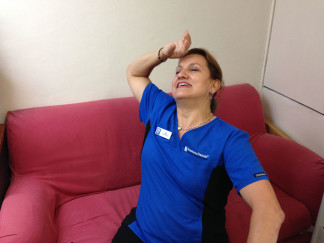Need an Appointment?
If you'd like to book an appointment with the dentist at Seymour Dental then contact us, or call us in Dulwich Hill, Sydney on (02) 9564 2397.
Fainting is a brief episode of unconsciousness caused by a sudden drop in blood pressure. The most likely cause of this sudden drop will either be some change in the blood vessels or the heartbeat itself.
Blood vessels continually adjust their width to ensure a constant blood pressure. For instance, the vessels constrict (tighten) when we stand up to counteract the effects of gravity. Temporary low blood pressure can be caused by various events that prompt blood vessels to dilate (expand), including extreme heat, emotional distress or pain. The lack of blood to the brain causes loss of consciousness.
Most fainting will pass quickly and won’t be serious. Usually, a fainting episode will only last a few seconds, although it will make the person feel unwell and recovery may take several minutes. If a person doesn’t recover quickly, always seek urgent medical attention.
Symptoms of fainting
The symptoms of a faint include:
- Dizziness
- Light-headedness
- A pale face
- Perspiration
- Heightened anxiety and restlessness
- Nausea
- Collapse
- Unconsciousness, for a few seconds
- Full recovery after a few minutes.
Occasionally, a collapse may be caused by a more serious event such as a stroke or a disturbance in the normal heart rhythm. A faint might be telling you something is wrong and further examination is sometimes important.
If a person complains of breathlessness, chest pains or heart palpitations, or if the pulse is faster or slower than expected, the person should see a doctor. Similarly, slurred speech, facial droop or weakness in any limbs are signs of a serious problem.
Causes of a drop in blood pressure
A temporary drop in blood pressure can be caused by different factors, including:
- Prolonged standing
- Extreme heat, which pushes blood away from the main circulatory system and into the vessels of the skin
- Emotional distress
- Severe pain
- The sight of blood
- The sight of a hypodermic needle
- Other events that a person may find distressing.
What to do if you feel faint
The most important action is to LIE DOWN, and if possible, elevate the feet. This may prevent a loss of consciousness. DO NOT SIT UP. We want the heart to not fight gravity in its efforts to get blood to the brain.
Fresh air can also help, especially if you are feeling hot. If it is not possible to lie down, put your head down as low as possible.
If you do faint, remain lying down for ten minutes. Sit up slowly when you need to get up.
Thanks for learning.
Next week: Blog Series – Cleaning Difficult Areas
 479 Marrickville Road
479 Marrickville Road
